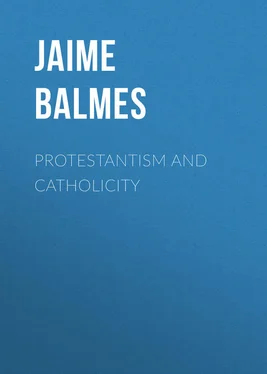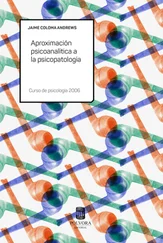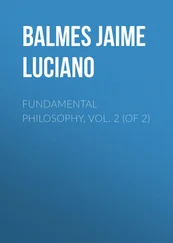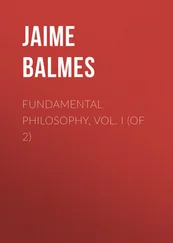Jaime Balmes - Protestantism and Catholicity
Здесь есть возможность читать онлайн «Jaime Balmes - Protestantism and Catholicity» — ознакомительный отрывок электронной книги совершенно бесплатно, а после прочтения отрывка купить полную версию. В некоторых случаях можно слушать аудио, скачать через торрент в формате fb2 и присутствует краткое содержание. Жанр: foreign_antique, foreign_prose, на английском языке. Описание произведения, (предисловие) а так же отзывы посетителей доступны на портале библиотеки ЛибКат.
- Название:Protestantism and Catholicity
- Автор:
- Жанр:
- Год:неизвестен
- ISBN:нет данных
- Рейтинг книги:3 / 5. Голосов: 1
-
Избранное:Добавить в избранное
- Отзывы:
-
Ваша оценка:
- 60
- 1
- 2
- 3
- 4
- 5
Protestantism and Catholicity: краткое содержание, описание и аннотация
Предлагаем к чтению аннотацию, описание, краткое содержание или предисловие (зависит от того, что написал сам автор книги «Protestantism and Catholicity»). Если вы не нашли необходимую информацию о книге — напишите в комментариях, мы постараемся отыскать её.
Protestantism and Catholicity — читать онлайн ознакомительный отрывок
Ниже представлен текст книги, разбитый по страницам. Система сохранения места последней прочитанной страницы, позволяет с удобством читать онлайн бесплатно книгу «Protestantism and Catholicity», без необходимости каждый раз заново искать на чём Вы остановились. Поставьте закладку, и сможете в любой момент перейти на страницу, на которой закончили чтение.
Интервал:
Закладка:
The observations which have just been made may be more or less well founded, more or less happy, but at least they do not present the inexplicable inconsistency, not to say contradiction, of allying barbarism and brutality with civilization and refinement; they do not give the name of an eminent and fruitful principle of European civilization to that which a little further on is pointed out as one of the strongest obstacles to the progress of social organization. As M. Guizot, on this last point, agrees with the opinion which I have just stated, and shows the incoherence of his own doctrines, the reader will allow me to quote his own words. "It is clear," he says, "that if men have no ideas extending beyond their own existence, if their intellectual horizon is limited to themselves, if they give themselves up to the caprices of their own passions and wills, if they have not among them a certain number of common notions and feelings, around which they rally; it is clear, I say, that no society can be possible among them; that such individual, when he enters into any association, will be a principle of disturbance and dissolution. Whenever individuality almost absolutely prevails, or man only considers himself, or his ideas do not extend beyond himself, or he obeys only his own passions, society, I mean one with any thing of extent or permanency, becomes almost impossible. Now such was the moral condition of the conquerors of Europe at the period of which we speak. I have pointed out, in the last lecture, that we owe the energetic feeling of individual liberty and humanity to the Germans. Now, in a state of extreme rudeness and ignorance, this feeling is egotism in all its brutality, in all its unsociability. From the fifth to the eighth century, such was the case among the Germans. They consulted only their own interests, their own passions, their own wills; how could this accord with the social state? It was attempted to make them enter it; they attempted it themselves; they soon left it from some sudden act, some sally of passion or misunderstanding. Every moment we see society attempted to be formed; every moment we see it broken by the act of man, by the want of the moral conditions necessary for its subsistence. Such, gentlemen, were the two prevailing causes of the state of barbarism. As long as they lasted, barbarism continued." ( Histoire Générale de la Civilisation en Europe , leçon 3.)
With respect to his theory of individuality , M. Guizot has met with the common fate of men of great talents. They are forcibly struck by a singular phenomenon, they conceive an ardent desire of finding its cause, and they fall into frequent errors, led away by a secret tendency always to point out a new, unexpected, astonishing origin. In his vast and penetrating view of European civilization, in his parallel between this and the most distinguished ones of antiquity, he discovered a very remarkable difference between the individuals of the former and of the latter. He saw in the man of modern Europe, something nobler, more independent than in the Greek or Roman; it was necessary to point out the origin of this difference. Now this was not an easy task, considering the peculiar situation in which the philosophical historian found himself. From the first glance which he took at the elements of European civilization, the Church presented herself to him as one of the most powerful and the most influential agents on the organization of society; and he saw issue from her the impulse which was most capable of leading the world to a great and happy future. He had already expressly acknowledged this, and had paid homage to the truth in magnificent language; in order to explain this phenomenon, should he again have recourse to Christianity, to the Church? This would have been conceding to her the whole of the great work of civilization; and M. Guizot was desirous, at all hazards, of giving her coadjutors. Therefore, fixing his eyes upon the barbarian hordes, he expects to discover in the swarthy brows, the savage countenances, and the menacing looks of these children of the forest, a type, somewhat rude but still very just, of the noble independence, the elevation, and dignity which the European bears in his features.
After having explained the mysterious personality of the Germans, and shown that, far from being an element of civilization, it was a source of disorder and barbarism; it is besides necessary to examine the difference which exists between the civilization of Europe and other civilizations, with respect to the feeling of dignity; it is necessary to determine with precision what modifications have been undergone by a feeling, which, considered by itself, is, as we have seen, common to all men. In the first place, there is no foundation for this assertion of M. Guizot, that the feeling of personal independence, the taste for liberty, displaying itself at all hazards, with scarcely any other object than its own satisfaction, was unknown to Roman society . It is clear that in such a comparison, it is not meant to allude to the feeling of independence in the savage state, in the state of barbarism; for as well might it be said that civilized nations could not have the distinctive character of barbarism. But laying aside that circumstance of ferocity, we will say that the feeling was very active, not only among the Romans, but also among the other most celebrated nations of antiquity. "When you find in ancient civilization," says M. Guizot, "liberty, it is political liberty, the liberty of the citizen. It is not with his personal liberty that the man is prepossessed, it is with his liberty as a citizen; he belongs to an association, he is devoted to an association, he is ready to sacrifice himself for an association." I will not deny that this spirit of sacrifice for the benefit of an association did exist among ancient nations; I acknowledge also that it was accompanied by remarkable peculiarities, which I intend to explain further on; yet it may be doubted whether the taste for liberty, with scarcely any other object than its own satisfaction , was not more active with ancient nations than with us. Indeed, what was the object of the Phœnicians, the Greeks of the Archipelago and of Asia Minor, the Carthaginians, when they undertook those voyages which, for such remote times, were as bold and perilous as those of our most intrepid sailors? Was it, indeed, to sacrifice themselves for an association that they sought new territories with so much ardour, in order to amass there money, gold, and all kinds of articles of value? Were they not led by the desire of acquiring to gratify themselves ? Where, then, is the association? Where do you find it here? Do you see any thing but the individual, with his passions and tastes, and his ardour in satisfying them? And the Greeks – those Greeks so enervated, so voluptuous, so spoiled by pleasures, had they not the most lively feeling of personal independence, the most ardent desire of living with perfect freedom, with no other object but to gratify themselves? Their poets singing of nectar and of love; their free courtesans receiving the homage of the most illustrious citizens, and making sages forget their philosophical moderation and gravity; and the people celebrating their festivals amid the most fearful dissoluteness; did they also only sacrifice on the altars of association? Had they not the desire of gratifying themselves? With respect to the Romans, perhaps it would not be so easy to demonstrate this, if we had to speak of what are called the glorious times of the Republic; but we have to deal with the Romans of the empire, with those who lived at the time of the irruption of the barbarians; with those Romans, greedy of pleasures, and devoured by that thirst for excess of which history has preserved such shameful pictures. Their superb palaces, their magnificent villas, their delicious baths, their splendid festive halls, their tables loaded with riches, their effeminate dresses, their voluptuous dissipation; do they not show us individuals who, without thinking of the association to which they belonged, only thought of gratifying their own passions and caprices; lived in the greatest luxury, with every delicacy and all imaginable splendour; had no care but to enjoy society, to lull themselves asleep in pleasure, to gratify all their passions, and give way to a burning love of their own satisfactions and amusements?
Читать дальшеИнтервал:
Закладка:
Похожие книги на «Protestantism and Catholicity»
Представляем Вашему вниманию похожие книги на «Protestantism and Catholicity» списком для выбора. Мы отобрали схожую по названию и смыслу литературу в надежде предоставить читателям больше вариантов отыскать новые, интересные, ещё непрочитанные произведения.
Обсуждение, отзывы о книге «Protestantism and Catholicity» и просто собственные мнения читателей. Оставьте ваши комментарии, напишите, что Вы думаете о произведении, его смысле или главных героях. Укажите что конкретно понравилось, а что нет, и почему Вы так считаете.












